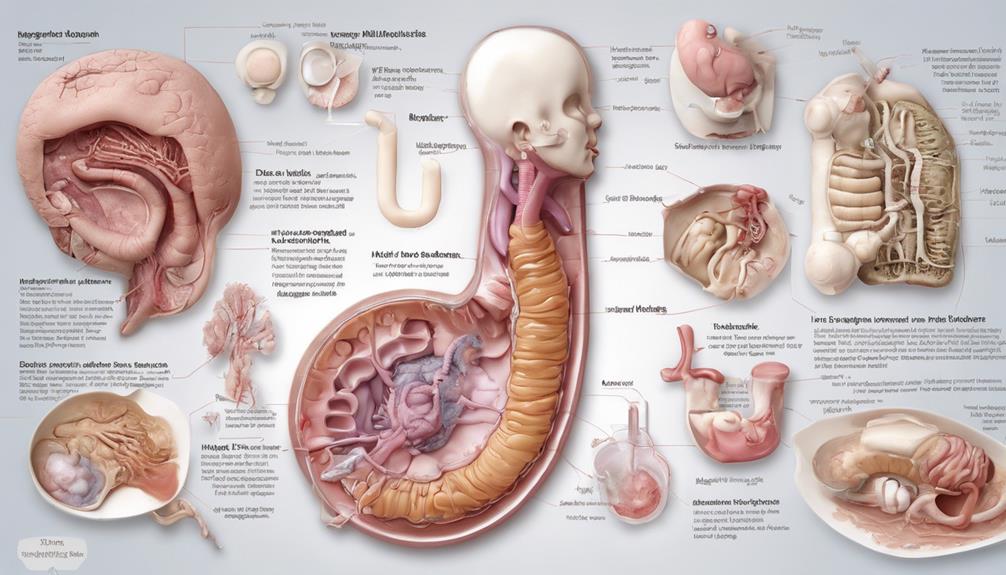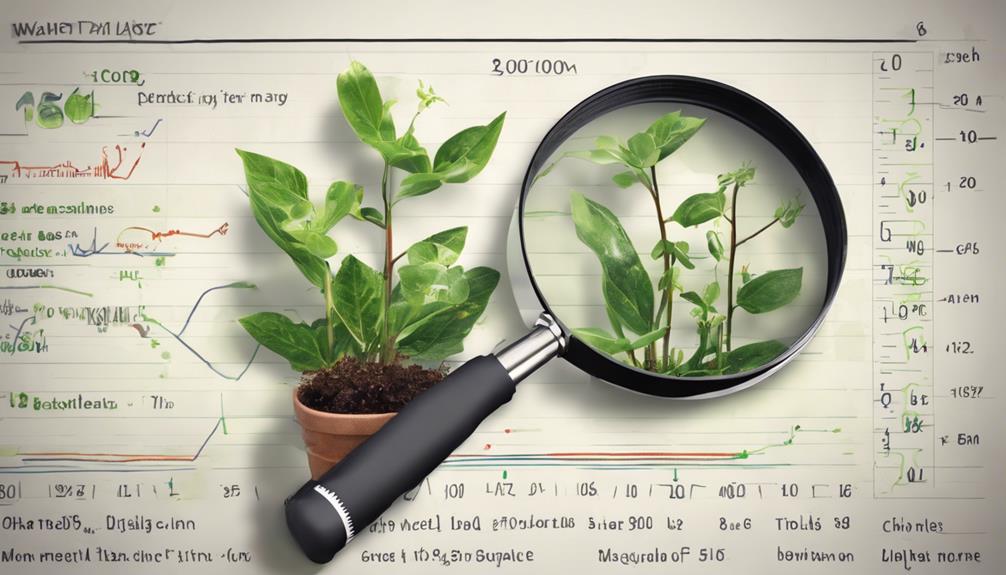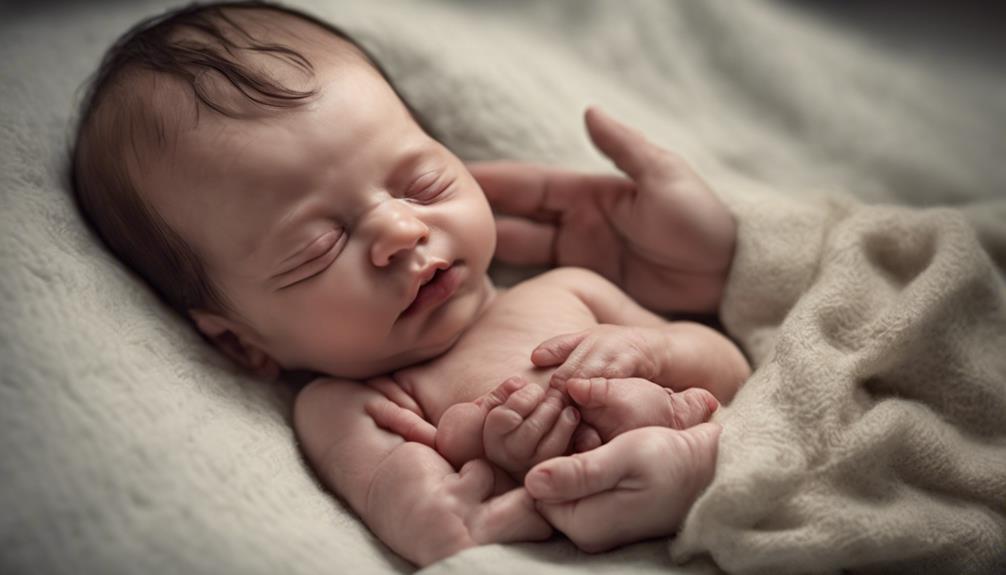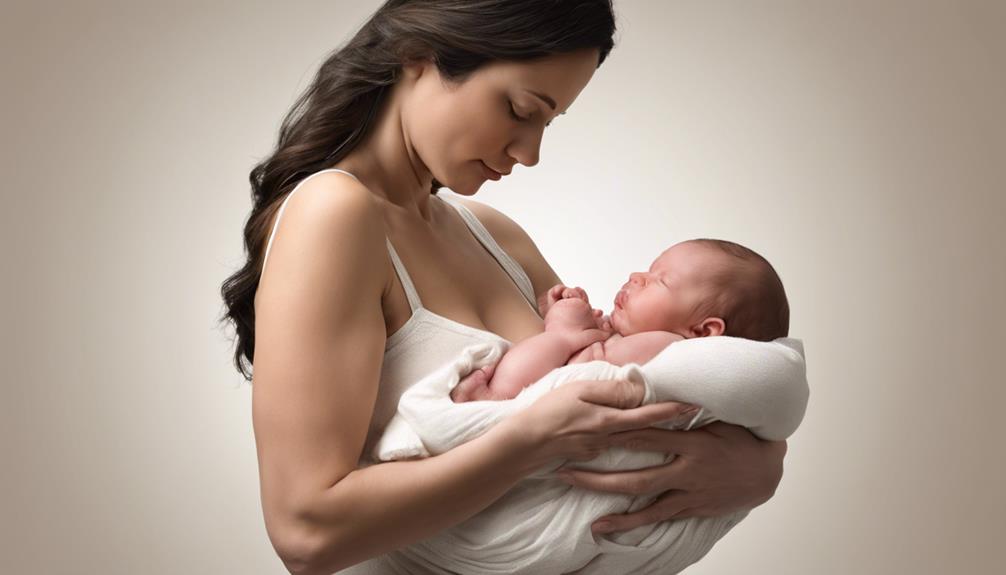Do you know that up to 50% of newborns experience hiccups after feeding?
It might be surprising to see your little one hiccuping away, but understanding the reasons behind it can provide some clarity.
From the mechanics of their tiny digestive systems to simple adjustments in feeding techniques, there's more to uncover about why those post-meal hiccups occur.
Key Takeaways
- Newborn hiccups result from diaphragm contractions and swallowing air while feeding.
- Hiccups post-feeding indicate an immature digestive system adapting to milk.
- Remedies include burping, smaller feedings, and upright positioning to aid digestion.
- Proper latch, positioning, and frequent burping help prevent hiccups in newborns.
Causes of Newborn Hiccups
When newborns experience hiccups after eating, it's often triggered by involuntary contractions in the diaphragm caused by various factors. These hiccups can be a result of irritation, possibly from swallowing air while feeding, which leads to the diaphragm spasms.
Overfeeding or feeding too quickly may also cause stomach distention, putting pressure on the diaphragm and resulting in hiccups in newborns post-meal. Since newborns have immature digestive systems that are still adapting to processing milk, this adjustment period can lead to hiccups after eating as well.
The good news is that these hiccups are typically harmless and tend to resolve on their own without the need for any specific treatment. So, if your little one experiences hiccups after a meal, know that it's a common occurrence due to these factors and usually nothing to worry about.
Digestive System in Newborns

Newborns possess an immature digestive system that plays an important role in their susceptibility to hiccups after eating. Your baby's developing gastrointestinal tract and smaller stomach size can contribute to these hiccups. The diaphragm, a muscle separating the chest and abdomen, contracts rapidly during hiccups, causing the vocal cords to open and close abruptly.
Hiccups in babies can sometimes be caused by swallowing air while feeding or even by overeating. These hiccups are usually harmless and tend to resolve on their own as your little one's digestive system matures. While it may be concerning to see your baby experience hiccups after eating, rest assured that this is a common occurrence in newborns.
To help prevent hiccups, try burping your baby more frequently during feedings and ensuring they're in an upright position while feeding. Remember, these hiccups are a part of your baby's digestive system development and will likely decrease as they grow.
Timing of Hiccups After Feeding

After feeding, newborns may experience hiccups due to the stimulation of their diaphragm during the swallowing process. The reflex action triggered by the intake of milk or formula can lead to muscle contractions that manifest as hiccups after feeding in newborns. These hiccups are typically harmless and actually signify a developing digestive system in your little one.
Due to their small size and delicate systems, the muscle contractions causing hiccups after eating may seem more pronounced in newborns. However, rest assured that hiccups after feeding in newborns usually subside on their own and don't necessarily indicate any issue with the feeding process.
Remedies for Newborn Hiccups
If your newborn is experiencing hiccups after eating, there are simple remedies that can help alleviate this common occurrence. Baby hiccups can be triggered by the stimulation of their developing diaphragm muscles during feeding or by swallowing air.
To help relieve these hiccups, try burping your baby during and after feedings. This can release any trapped air and reduce the chances of hiccups. Offering smaller and more frequent feedings to your newborn can also help prevent hiccups after eating, as it reduces the amount of air swallowed during feeding sessions.
Additionally, keeping your baby in an upright position for a while after feeding can aid in digestion and minimize the likelihood of hiccups. By incorporating these simple practices into your baby's routine, you can effectively alleviate and prevent hiccups after feeding.
Preventing Hiccups in Newborns

Feeding your newborn in a calm and unhurried manner can greatly help in preventing hiccups after meals. Here are three essential tips to assist you in minimizing hiccups in your little one:
- Guarantee Proper Latch and Positioning: When breastfeeding, make sure your baby has a good latch to prevent swallowing excess air, which can lead to hiccups. Positioning your baby correctly during feeding can also help reduce the chances of hiccups.
- Frequent Feedings for Better Digestion: Offering smaller, more frequent feedings to your newborn can aid in digestion and reduce the likelihood of hiccups occurring after meals. This approach can help prevent your baby from gulping down air while feeding.
- Burp and Keep Upright: Remember to burp your baby regularly during and after feeds to release trapped air. Keeping your newborn in an upright position for a short period after eating can further aid in digestion and minimize post-feeding hiccups.
Frequently Asked Questions
How Do I Stop My Newborn From Hiccuping After Feeding?
To stop your newborn from hiccuping after feeding, try burping them during and after meals. Create a calm feeding environment and pace their meals to prevent hiccups. Check your bottle feeding techniques and avoid overfeeding for a hiccup-free experience.
Does Newborn Hiccups Mean Overfeeding?
Feeling unsure if newborn hiccups signal overfeeding? They're often normal and not just due to chowing down. Keep calm, burp your little one, and remember, those cute hiccups usually vanish on their own.
Should I Keep Feeding My Newborn if He Has Hiccups?
If your newborn has hiccups, it's okay to keep feeding them. Hiccups usually don't bother their feeding. Just make sure they're comfortable. Keep them upright during and after meals to prevent hiccups and aid digestion.
Is It OK to Lay Baby Down With Hiccups?
It's perfectly fine to lay your baby down with hiccups. Hiccups don't harm their breathing. If hiccups persist, consulting a pediatrician is wise. Monitor for any discomfort. No need to worry about putting them down.
Conclusion
Don't fret if your little one gets hiccups after eating! Remember, hiccups are harmless and happen often in newborns. By burping, feeding slowly, and holding them upright, you can help ease those pesky hiccups.
Preventing hiccups in newborns is possible with proper feeding techniques and addressing any underlying issues. So, stay calm and cuddle your cutie as you conquer those hiccups together!









